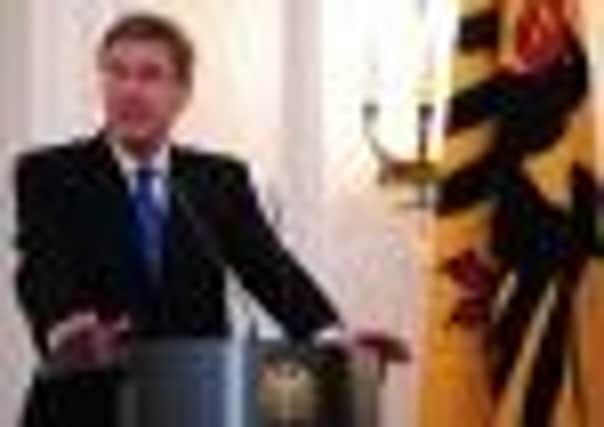German president Christian Wulff resigns over scandal


Angela Merkel’s hand-picked choice for the ceremonial post of Germany’s president resigned yesterday in a scandal over political favours, dealing a heavy blow to the chancellor.
In a curt five-minute statement at the Bellevue presidential palace, Christian Wulff, 52, acknowledged that he had lost the trust of the German people, making it impossible to continue in a role meant to serve as a moral compass for the nation.
Advertisement
Hide AdAdvertisement
Hide Ad“It is no longer possible for me to exercise the office of president at home and abroad as required,” said Mr Wulff, standing next to his wife, Bettina.
Ms Merkel postponed a trip to Rome, where she was to hold talks on the debt crisis with Italian prime minister Mario Monti, to deal with the fallout from Mr Wulff’s departure.
In a statement she said she regretted his departure and would seek talks with opposition parties to find a replacement.
The chancellor is riding a wave of popularity in Germany for her handling of the debt crisis, but the departure of Mr Wulff raises questions about her judgment because she forced through his appointment in 2010 over a strong opposition candidate most Germans favoured.
He is the second president to step down in less than two years. His predecessor, former International Monetary Fund chief Horst Koehler, resigned unexpectedly after coming under fire for comments he made about the German mission in Afghanistan and failing to get strong backing from Ms Merkel.
How much of a distraction the Wulff saga becomes depends on how fast a successor can be agreed. A vote in the 1,244-seat Federal Assembly must take place within a month.
Gerd Langguth, a political scientist at Bonn University, said: “This won’t be without consequences for Merkel, her reputation will suffer from it.”
Ms Merkel will not face another federal election personally until autumn 2013. But her party faces battles to hold onto power in Saarland and Schleswig-Holstein in regional votes due in March and May.
Advertisement
Hide AdAdvertisement
Hide AdA member of Ms Merkel’s Christian Democratic Union) who served as premier of the western state of Lower Saxony, Mr Wulff was once seen as a potential rival to Ms Merkel and many in Germany saw his appointment as a ploy by the chancellor to push him out of the political arena.
His reputation took a hammering when newspaper Bild reported late last year that he had misled the state parliament about a cheap €500,000 home loan from a businessman friend before becoming president.
Last month he admitted making a “grave mistake” by threatening the editor of Bild with “war” if he published the story about his private finances.
Since then, there has been a constant stream of revelations that have chipped away at his credibility, leading the German media to mock him and even invent a new verb in his honour. “Wulffen” – “to Wulff” – meaning to be evasive without telling a clear lie.
Mr Wulff has been one of the main targets at this year’s carnival celebrations in the Rhineland, where politicians are traditionally lampooned.
One float in the city of Mainz has an effigy of him slumped at the edge of a boxing ring with a black eye and sticking plaster on his forehead. In Cologne, where the biggest processions take place, Wulff is dressed up as a grey rabbit on a butcher’s table about to be carved up.
On a trip to Rome earlier this week, Mr Wulff made clear he planned to hang on to his post. But the situation changed dramatically on Thursday evening when state prosecutors in Hannover, the capital of Lower Saxony, asked parliament to end his legal immunity over accusations he accepted favours in a prelude to opening an investigation.